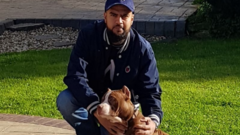Why Was the Man Who Cropped Dogs' Ears Sentenced?

Understanding the Impact of Animal Cruelty: The Case of Moheiz Adam
The case of Moheiz Adam, a self-proclaimed "dog whisperer" from Newport, has brought to light the dark side of animal breeding and the severe consequences of animal cruelty. Adam was sentenced to nearly two years in prison, suspended for two years, after admitting to the mutilation of puppies' ears. This shocking incident has raised important questions about animal welfare, the responsibilities of breeders, and the measures in place to protect animals from harm. In this article, we will explore the details of Adam's actions, the legal implications, and the broader implications for animal welfare in the UK.
The Disturbing Practices of Moheiz Adam
Moheiz Adam's case began when an undercover BBC reporter posed as a potential customer interested in purchasing an American Bully type dog. During this investigation in 2021, Adam offered puppies for prices reaching up to £13,000, citing the appeal of ear cropping to give dogs a "striking" appearance. Despite the practice being illegal in the UK, Adam claimed it was "a shame" that the procedure was prohibited.
What is ear cropping? This painful and unnecessary procedure involves surgically removing skin from the tops of dogs' ears to reshape them, promoting a more upright posture. The Royal Society for the Prevention of Cruelty to Animals (RSPCA) has condemned this practice as it causes significant pain and suffering to the animals involved.
Uncovering the Truth
Following the undercover investigation, animal welfare officers responded to multiple complaints about Adam's dogs. A search of his home revealed not only evidence of mutilated puppies but also seven fraudulent pet passports intended to mislead prospective buyers into believing that the dogs had been imported from abroad, where the mutilation supposedly occurred legally.
Judge Eugene Egan, who presided over Adam's case, criticized him for "selfishly prioritizing" his financial gain over the welfare of the dogs. The judge highlighted the barbaric nature of Adam's actions, which resulted in unnecessary pain and suffering for the animals. Adam's initial denial of wrongdoing gave way to guilty pleas on charges related to animal cruelty and possession of fraudulent documents.
The Broader Implications for Animal Welfare in the UK
The case of Moheiz Adam serves as a stark reminder of the ongoing challenges faced by animal welfare organizations in the UK. The demand for certain breeds and appearances continues to drive unethical breeding practices, including ear cropping and other forms of mutilation.
The Role of Legislation
As Vanessa Waddon from Hope Rescue pointed out, the desire for specific looks in dogs remains a significant welfare issue. Although new legislation is being considered to ban the importation of dogs with cropped ears, existing breeding legislation has its shortcomings. There are still numerous loopholes that allow unethical breeders to continue their practices with little fear of repercussions.
To effectively combat animal cruelty, it is crucial that legislation is tightened, and resources for enforcement are increased. This includes not only stricter regulations on breeding but also educational initiatives aimed at informing potential dog owners about the ethical implications of their choices.
The Importance of Responsible Breeding
Responsible breeding is essential for ensuring the health and well-being of dogs. Breeders must prioritize the welfare of their animals, avoiding practices that may lead to suffering or health issues. Prospective dog owners should research breeders thoroughly, seeking out those who adhere to ethical standards and prioritize the needs of their dogs over profit.
Raising Awareness About Animal Cruelty
Public awareness plays a pivotal role in combatting animal cruelty. Initiatives focused on educating the public about the signs of animal abuse, the importance of spaying and neutering, and the need for responsible pet ownership can help reduce the demand for poorly bred animals. Organizations like the RSPCA and local animal control agencies are vital in this effort, but they need community support to be effective.
What Can You Do to Help?
As individuals, there are several steps we can take to help protect animals and promote responsible breeding practices:
- Adopt, Don’t Shop: Consider adopting a pet from a local animal shelter. Many animals in shelters are in need of loving homes.
- Educate Yourself: Learn about responsible breeding practices and the signs of animal cruelty. Being informed can help you make better choices as a pet owner.
- Support Animal Welfare Organizations: Contribute to or volunteer with organizations that work to protect animals and advocate for stricter regulations on breeding.
- Report Suspected Abuse: If you suspect animal cruelty, report it to your local authorities or animal welfare organizations.
Conclusion: A Call for Change
The case of Moheiz Adam highlights the urgent need for change within the animal breeding industry. It serves as a reminder that the health and welfare of animals must always take precedence over profit. As a society, we have a responsibility to protect the most vulnerable among us, including our pets. By advocating for stronger legislation, supporting animal welfare organizations, and making informed choices as pet owners, we can work towards a future where no animal suffers due to unethical breeding practices.
FAQs About Animal Cruelty and Breeding
What is ear cropping, and why is it illegal in the UK?
Ear cropping is a surgical procedure that involves removing part of a dog's ear to change its shape or appearance. It is considered illegal in the UK due to the pain and suffering it causes to the animal and is viewed as unnecessary cosmetic surgery.
How can I identify a responsible breeder?
A responsible breeder will prioritize the health and well-being of their dogs, provide proper documentation, and allow you to visit their facilities. They should also be willing to answer any questions about their breeding practices and the health of the puppies.
What should I do if I suspect animal cruelty?
If you suspect animal cruelty, you should report it to your local authorities or animal welfare organizations. They can investigate the situation and take appropriate action to protect the animals involved.
How can we collectively work towards ending animal cruelty?
By raising awareness, supporting legislation for stricter animal welfare laws, adopting pets from shelters, and educating others about ethical pet ownership, we can collectively work towards ending animal cruelty. Together, we can create a society that values the welfare of all living beings.
As we reflect on the case of Moheiz Adam, we must consider our roles in advocating for animal welfare. Are we doing enough to protect those who cannot protect themselves? Together, we can make a difference. #AnimalWelfare #StopAnimalCruelty #ResponsibleBreeding
Published: 2025-07-08 14:35:07 | Category: wales



